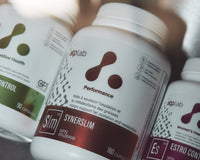Estrogen Dominance Part 2: How you get it, understand it and control it

Part two: Practical applications
Of course, as mentioned {in this first article}, estrogen status is heavily influenced by lifestyle, including stressors and several ways to control it. While some recommendations can be very potent but hard to achieve, others are as simple as avoiding certain packaging, foods or pills, or using certain supplements to support our organism. Below you can go through a list of recommendations to get a better grip on estrogen.
Food:
1. Buy water in glass bottles, get a water-filter (fluoride) Many have heard of Bisphenol A or BPA and other chemicals as being part of plastic bottles in drinking water. Especially if a bottle is kept in a warm place – like your car on a warm day – the chemical ingredients from the bottle can interact with water and dilute into it [1]. That way we not only put pressure on our liver by having to detoxify those foreign substances, BPA and also plastic molecules can mess with our system in other ways [2,3]. While there are already some BPA-free plastic bottles on the market, try to opt out for glass. If that is not possible, go with BPA-free plastic. Also, try to avoid drinking water from the tab, especially in cities. Many substances like drugs, heavy metals and fluoride contaminate regular sources, which can have a negative impact on your health [4]. Try to get a hold on a decent water filter like reverse osmosis or activated charcoal filters.2. Avoid certain foods and food containers While plastic packaging is also widely spread with food products, pesticides and other foreign substances often stay in processed food. Chemical processing damages nutrient content and can oxidise lipids like omega-3-fatty acids, while pesticides and drugs used on livestock can still be found in the meat, vegetables, fruits, grains and anything else, that you eat [5,6]. Whole foods, organic origin and a decent food quality are something, all nutritionist agree on, when it comes to healthy eating. Avoiding salt is also a bad idea. You need salt. Period. It has lots of effects on cell communication and metabolism. Avoiding it, can be stressful and drinking a glass of (good) water with some lemon in it and a bit of salt (without fluoride), can help reduce stress symptoms. Yes, it might increase blood pressure, but most people never think about that as being something indicating an increase in metabolism in normal healthy people [7]. Exercise also increases blood pressure, as your tissues require more oxygen for energy production. 3. Leaky gut and other inflammatory conditions Processed foods, not enough sleep and stress in general can lead to inflammation in the gut and increased permeability of the gut wall. Our microbiome has become a rockstar in science research for a good reason. While there are many ways to influence and address the gut microbiota, avoiding energy dense food, void of nutritious value and with almost no fibre and high in toxins can work wonders on many symptoms associated with SIBO, IBS and other known ailments [8,9,10]. Another reason why eating quality food with lots of colours is good for you. There are a ton of recipes on the web with easy and fast healthy foods, even when you’re in a hurry. It is simple and has positive effects on estrogen, inflammation, brain fog, energy and metabolism and much more. Go for it!
Lifestyle
1. Sleep in a darkened room Sleep is important. Not only will you feel more energized the next morning, melatonin and many other hormones initiate an important and regenerative cascade to not only rejuvenate or sort out damages cells. Your health and wellbeing depend immensely on energy-efficiency [11]. Sleep deprivation has been associated with multiple physiological changes, including increased cortisol and ghrelin levels, decreased leptin levels and impaired glucose metabolism. Experimental studies have also shown an increase in inflammatory and pro-inflammatory markers, which are indicators of body stress, under sleep deprivation. Sleep deprivation not only raises your inflammation level and decreases your ability to regenerate. It also makes you more hungry and stressed and as we know, especially in women, stress can increase estrogen. One way to improve sleep besides avoiding eating too late or drinking alcohol and doing something relaxing prior to sleep like meditation is to make sure that your bedroom is as dark as possible. Even small amounts of light can disturb your sleep cycle and suppress melatonin [12]. 2. Circadian disruption is more than just bad for your sleep Even though melatonin is seen as the hormone of darkness, it actually gets produced in the morning [13]. UVA exposure stimulates melatonin production, so that it can be released in the evening. Provided however, that you give your body the right signal in the evening. Try to avoid artificial lighting a few hours before bedtime. Nothing stops your pineal gland more from releasing melatonin than bright light. Using candles, infrared light or blueblockers can help your body big time [14]. We only had access to 24/7 light for around a 100 years. Our body is heavily entrained to so called ”Zeitgebers” [15]. Messing with our circadian rhythm has massive consequences on our health. Jet lag and shift work are two heavily discussed examples of that [16].3. Don’t get overstimulated Stimulation and stress go hand in hand and everyone, who lives in a bigger city with all its electric devices, flashing displays, televisions, computers, smartphones etc. gets immensely impacted by all these impulses. Without us knowing it, our body constantly processes its environment and tries to make sense of it [17]. Loud or penetrant noises (imagine a clock ticking), while trying to sleep, are a good example of that. Living in a big city and spending lots of your time on the internet and Facebook is comparable to ”loud visuals”, stressing your system out and making you itchy or impulsive. Most people are not aware of it, while feeling worn out. If you go out camping for a week or two and return home, you’ll notice how strong it can affect your senses.
4. Surround yourself with good company Vampires do exist. They don’t suck blood however, but rather your energy. Many people have someone in mind, when you describe an energy vampire. Every time you spend time with them, you feel a little worn out, have less self-worth, you tend more to distrust others or just feel sad. Try looking out for people that provoke the opposite effect in you. Surround yourself with good company. Get to enjoy life, try out new things and have some great time. This might sound odd, but there is actually something called ”learned helplessness”, which is one of the worst emotional states you can live in [18]. In short it means that you are living with something you cannot cope with, that drains your energy and that you cannot get rid of. At some point your mind will accept it and suffer silently. It is not fight or flight, but freeze – and it harms your health big time!
5. Set goals and seek fulfilment This is actually a hard nut to crack, as most people are not even so sure about what they really want. Most people might shake their heads and say that they know, what they want to achieve. A fast car, lots of money, a family, a big house, an athletic body, a trip around the world or a structured life are mostly just a proxy for more. Some seek attention, others acceptance – but what gives you a feeling of real fulfilment? Spend time on that question and keep in mind, that we are experts at lying to ourselves. When you got the answer, go for it. When you’re right, you’ll be able to move mountains and have energy you didn’t know you had it in you. This might not sound scientific, but it is one of the most potent antidotes for learned helplessness, stress and of course – estrogen dominance.
Supplements and drugs
1. Avoid birth control pills While it might sound strange that something containing a ”female” hormone would lead to the prevention of pregnancy, birth control pills are a well-known source for exogenous estrogens [19]. While it is widely used and while everyone has to decide for themselves, how they want to have fun without ”consequences”, you might want to try out other ways. As a general recommendation non-hormonal-birth control might be the way to go with the least amount of side-effects. From a structural point of view however, putting something like an IUD in such a sensitive spot like the vaginal canal might have its effects on its own. Keep in mind that living things are dependent on reproduction and interfering with this process in any way should naturally lead to bodily reactions. 2. Supplements that help with estrogen dominance As there a compounds that increase estrogen, there are also supplements to regulate it. Some of them help the liver with detoxification, others regulate inflammatory responses or regulate your stress level. Keep in mind that supplements don’t fix, but help to fix issues. Some of them help long term and in today’s times some supplements could be considered a staple to counteract our modern lifestyle. If you have read until this point however, you should know that we are well responsible for our own health by making smart moves. Below are some ingredients, you might look out for, when you want to support your body with some supplemental support:DIM (3,3'-Diindolylmethane): DIM is an agent extracted from Brassica genus including broccoli, Brussels sprouts and cabbage. While eating those vegetables is nice, therapeutical doses might need to force you to eat a bit more than you might like. It seems to help metabolise estrogens in the body [20]. Secondary to activating AhR activity, it is possible for DIM to increase the process of 2-hydroxylation and cause a shift in preexisting estrogen metabolites to a profile which is seen as less estrogenic; evidence for this has been seen in women given low dose supplements
Adaptogens: Herbal extracts like Ashwaghanda or Rhodiola Rosea are known to help regulate stress levels in humans. Adaptogens are known for their regulating effects [21]. Anything that helps keeping cortisol under control, helps with estrogen dominance. The treatment group that was given the high-concentration full-spectrum Ashwagandha root extract exhibited a significant reduction (P<0.0001) in scores on all the stress-assessment scales on Day 60, relative to the placebo group. The serum cortisol levels were substantially reduced (P=0.0006) in the Ashwagandha group, relative to the placebo group. The adverse effects were mild in nature and were comparable in both the groups. No serious adverse events were reported. […] The findings of this study suggest that a high-concentration full-spectrum Ashwagandha root extract safely and effectively improves an individual's resistance towards stress and thereby improves self-assessed quality of life.
Tumeric: Tumeric has well studied antiinflammatory effects, especially when combined with piperine. Piperine is also known to help tight junctions in your gut to be less permeable [22,23]. Turmeric and its derivatives have anti-inflammatory activities. Unlike ginger, turmeric and curcumin do not modulate COX-1 activity,14,15 but modify NF-κB signaling, proinflammatory cytokines such as interleukin production and phospholipase A2, COX-2, and 5-LOX activities. Curcumin also modulates the expressions of various transcription factors involved in energy metabolism such as signal transducer and activator of transcription, peroxisome proliferator-activated receptor-γ, activator protein-1, cAMP responding element binding protein, estrogen response element, and others.
Green tea extract: Enjoying a cup of tea is nice and green tea has been a target for decades. Some studies suggest, that it helps to get estrogens out of the system [24]. As green tea and its effects are also dose dependant, using an extract can help to get significant results. In postmenopausal women, urinary estrone and estradiol were approximately 20% and 40% lower (P trend = 0.01 and 0.05, respectively) in women drinking green tea daily compared to those drinking <1 time/week. Adjustment for potential confounders (age at menarche, parity/age at first birth, body mass index, Asian birthplace, soy) did not change these associations.
Calcium-D-glucarate (CaG): CaG shows promising effects on reducing estrogen levels by inhibiting beta-glucuronidase activity in the liver and intestines by its precursor D-glucaro-1,4-lactone [25]. A single dose of CaG (4.5 mmole/kg body weight) inhibited beta-glucuronidase activity in serum and liver, lung, and intestinal microsomes by 57, 44, 37, and 39%, respectively. A chronic administration of calcium glucarate (4% in diet) also decreased beta-glucuronidase activity in intestinal and liver microsomes. There are no adverse effect known and Calcium-D-glucarate seems safe [26]. However, testosterone is also a hormone that is glucuronidated, which means calcium D-glucarate may have effects on testosterone metabolism.
Sulphurophane: Sulphurophane or sulphurophane containing products can help if a person is under (chronic) high oxidative stress. Protective effects against liver damage especially were significant. While this might sound beneficial, keep in mind that oxidative damage and reactive oxygen species also work as signalling molecules, inducing controlled cell death or recycling (apoptosis, autophagy) and much more [27]. The aim of the present study was to reveal the possible effect of sulforaphane on oxidative stress and inflammation in rats liver with toxic hepatitis induced by acetaminophene. […]Sulforaphane is a protective agent against acetaminophen-induced liver damage and it can be added in the treatment protocol (Tab. 1, Fig. 5, Ref. 51).
References: 1 https://www.ncbi.nlm.nih.gov/pmc/articles/PMC3222987/ 2 https://www.ncbi.nlm.nih.gov/pmc/articles/PMC3938763/ 3 https://www.ncbi.nlm.nih.gov/pmc/articles/PMC3997912/ 4 https://www.ncbi.nlm.nih.gov/pmc/articles/PMC3956646/ 5 https://www.ncbi.nlm.nih.gov/pubmed/10335367 6 https://www.ncbi.nlm.nih.gov/pmc/articles/PMC5699236/ 7 https://www.ncbi.nlm.nih.gov/pubmed/18470897 8 https://www.ncbi.nlm.nih.gov/pmc/articles/PMC3099351/ 9 https://www.ncbi.nlm.nih.gov/pubmed/28731144 10 https://www.ncbi.nlm.nih.gov/pmc/articles/PMC4947579/ 11 https://www.ncbi.nlm.nih.gov/pmc/articles/PMC3132857/ 12https://www.ncbi.nlm.nih.gov/pmc/articles/PMC3047226/ 13 https://www.ncbi.nlm.nih.gov/pmc/articles/PMC113771/ 14 https://www.ncbi.nlm.nih.gov/pmc/articles/PMC4284776/ 15 https://www.ncbi.nlm.nih.gov/pmc/articles/PMC2849779/ 16 https://www.ncbi.nlm.nih.gov/pubmed/24138359 17 https://www.ncbi.nlm.nih.gov/pubmed/29366698 18 https://www.ncbi.nlm.nih.gov/pmc/articles/PMC5114549/ 19 https://www.ncbi.nlm.nih.gov/pmc/articles/PMC4827491/ 20 https://www.ncbi.nlm.nih.gov/pubmed/11698343 21 https://www.ncbi.nlm.nih.gov/pmc/articles/PMC3573577/ 22 https://www.ncbi.nlm.nih.gov/pmc/articles/PMC5003001/ 23 https://www.ncbi.nlm.nih.gov/pubmed/19594223 24 https://nutritionj.biomedcentral.com/articles/10.1186/1475-2891-12-25 25 https://www.ncbi.nlm.nih.gov/pubmed/2346674 26 https://www.ncbi.nlm.nih.gov/pubmed/12197785 27 https://www.ncbi.nlm.nih.gov/pubmed/29050482






